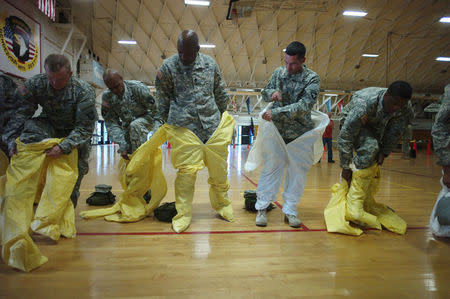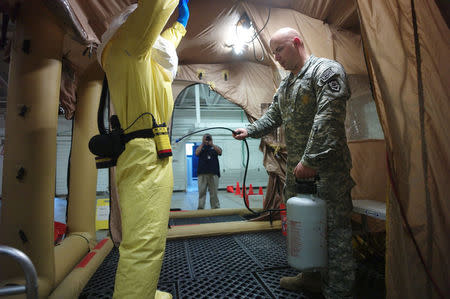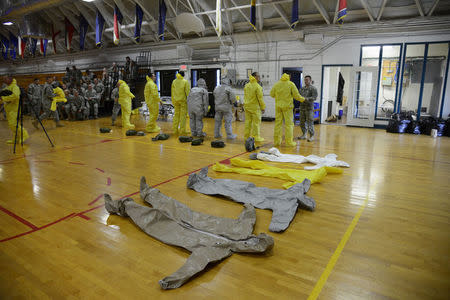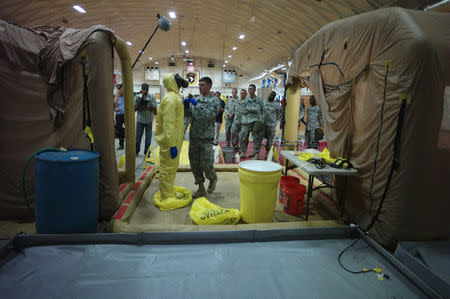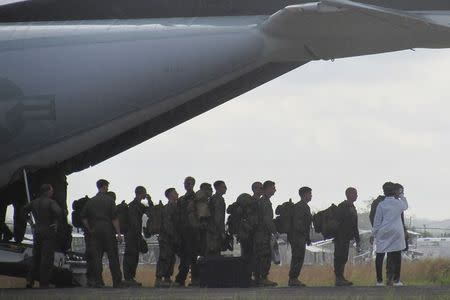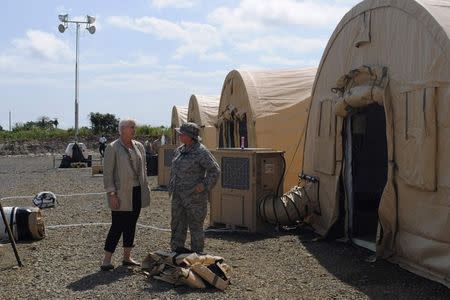U.S. troops take on invisible enemy in Liberia Ebola mission
By Daniel Flynn ROBERTS INTERNATIONAL AIRPORT Liberia (Reuters) - Marine pilot Captain Chris Legere has dropped troops into combat in Afghanistan and flown into Libya to evacuate U.S. embassy staff, but now he faces an enemy both silent and invisible: Ebola. Legere is part of a U.S. mission of up to 4,000 troops deploying to West Africa to help contain an outbreak of the hemorrhagic fever that President Barack Obama has called a threat to global security. The disease, which has no proven cure, has killed nearly 3,900 people in West Africa, more than half of them in Liberia, a nation founded by freed American slaves. It has also reached the United States and Spain. Legere said working in an Ebola "hot zone" was unlike anything he had done before, but U.S. troops had been well educated on the dangers of the virus, which is transmitted by bodily fluids and has killed more than half of those it has infected. "We try not to think about that. We think more about the good that we can provide for these people," said the pilot. He said his family in North Carolina had told him to take care, but added: "They understand the opportunity to do good here. The way I see it, it could be my wife and son here." Donors have promised hundreds of millions of dollars in aid amid fears of a global pandemic, but many in Liberia -- including President Ellen Johnson Sirleaf herself -- say that help has been too slow in coming. The nation of 4 million people was still struggling to recover from a civil war that lasted from 1989 to 2003 when Ebola struck. MARINES ARRIVE With the U.S. now accelerating its deployment, around 100 U.S. marines arrived on Thursday aboard two giant KC-130 transport aircraft, which touched down in the rain at Roberts International Airport outside Monrovia. Major General Darryl Williams, commanding the deployment, said construction was already under way on Ebola Treatment Units (ETUs) in the provincial towns of Tubmansburg, Sinje and Buchanan. A special 25-bed facility at the airport to treat infected medical staff was also nearly complete. "The military is used to operating in complex environments so yes, it's unique, but our soldiers, sailors, airmen and marines are up to the test," said Williams, dressed in combat fatigues, outside the field hospital. "The good thing about operating in Liberia is that nobody is shooting at us." Many Liberians are thrilled to receive help from the United States, regarded by many as a kind of big brother. Liberia's flag mirrors the Stars and Stripes but has a single star instead of 50, and its capital is named after 19th century U.S. president James Monroe, a prominent supporter of the establishment of American colonies in Africa. "The relationship of America and Liberia goes way back," said Hans Anderson, 31, a worker at the Central Bank. "In times gone by in our crises, our civil war, America was here with us. America has never leave us." ACCESS TO REMOTE AREAS Legere is part of a team of marines piloting MV-22 Osprey aircraft - whose propellers can rotate upwards to allow them to take off and land vertically like helicopters. The arrival of four of these planes on Thursday will allow the U.S. military quickly to fly medical personnel and supplies to up to 17 Ebola treatment centers planned in distant parts of rural Liberia, many of which lack landing strips. "A lot of these units are in remote locations where it would take upwards of four days to arrive. We can do it in 35 minutes. That's what we bring to the fight," Legere said. Despite the epidemic, life on the streets of Monrovia carries on largely as normal, with markets still busy and shops and businesses open, although Johnson Sirleaf has used emergency powers to close schools and impose a night-time curfew. But signs of the battle being waged against the deadly disease are visible. By the blackened hulk of the unfinished Defense Ministry building in the Congo Town neighborhood, a 300-bed ETU is quickly being erected by USAID and U.N. agencies. U.S. Ambassador Deborah Malac said huge progress had been made since July and August, when Liberian authorities were facing the epidemic alone. The United States has already set up two mobile laboratories to speed up the testing for Ebola. "We have already seen momentum building," she said. "What we need is the additional logistical support and capabilities and energy that the U.S. military can bring to this effort." (Editing by Kevin Liffey)
